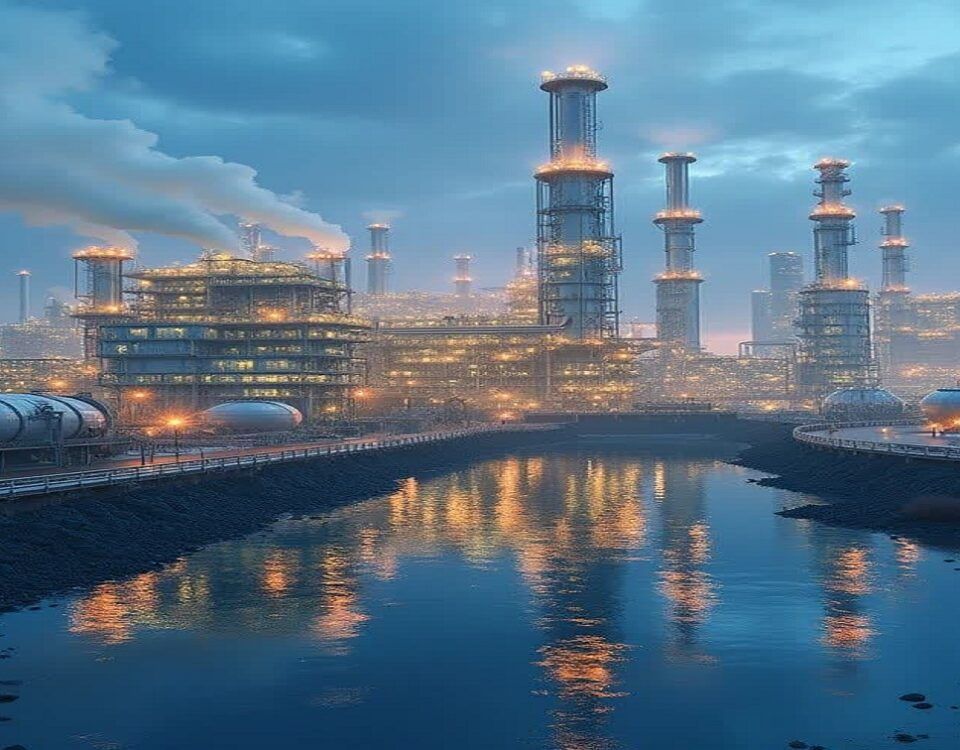
Academic and Student Project
مهر ۸, ۱۴۰۳
Chemical Engineering vs. Applied Chemistry vs. Pure Chemistry
مهر ۸, ۱۴۰۳Introduction to Chemical Engineering
Chemical Engineering is a relatively new discipline that is considered interdisciplinary, combining various fields of study. This field initially emerged from Mechanical Engineering, which is why many of the undergraduate courses share similarities with fluid mechanics courses in mechanical engineering. However, there are also several specialized and unique courses tailored specifically for Chemical Engineering, which will be detailed further.
Like other engineering disciplines, Chemical Engineering requires a creative and active mind for designing, calculating, and implementing complex industrial processes. Unlike laboratory-centric fields, such as various branches of chemistry, this discipline, especially at the undergraduate level (and sometimes beyond), does not necessarily require extensive laboratory work; only a limited number of common laboratory courses are offered for introductory purposes during the undergraduate program. However, some concentrations, such as catalysis, thermokinetics, pharmaceuticals, and biotechnology, typically require laboratory work for the completion of theses. Other master’s and doctoral level concentrations may never involve laboratory work and instead focus on programming and computer simulation. Among the most common of these concentrations are simulation, control, optimization, certain separation processes, transport phenomena, and even thermodynamics.
Often, friends or acquaintances preparing for exams may ask about the differences between Chemical Engineering, Pure Chemistry, and Applied Chemistry. Answers to these questions can be found in the written document detailing the distinctions between these fields.
Which Universities Offer Chemical Engineering?
Several universities in Iran offer Chemical Engineering, including:
– Sharif University of Technology
– University of Tehran
– Amirkabir University of Technology
– Iran University of Science and Technology (Tehran)
– Isfahan University of Technology
– Shiraz University
– Ferdowsi University of Mashhad
– University of Gilan
– Petroleum University of Technology
– Tabriz University
– Yazd University
– Qom University
– And many others…
Course Structure in Chemical Engineering
The total number of academic credits for a Chemical Engineering degree is 140 credits, which include:
– General Courses: 20 credits
– Basic Courses: 46 credits
– Specialized Courses: 55 credits
– Elective Courses: 19 credits
Key Academic Courses in Chemical Engineering
Some of the most important courses in Chemical Engineering include:
– Introduction to Chemical Engineering
– Mass and Energy Balances
– Fluid Mechanics I and II
– Heat Transfer I and II
– Mass Transfer
– Industrial Unit Operations I and II
– Process Control I and II
– Thermodynamics I and II
– Numerical Methods
– Advanced Engineering Mathematics
– Differential Equations
– General Chemistry Laboratory
– Analytical Chemistry Laboratory
– Organic Chemistry Laboratory
– Unit Operations Laboratory
– Physics Laboratory in Electricity
– General Chemistry I and II
– Physical Chemistry
– Organic Chemistry
– Corrosion Engineering
Relevant High School Courses for Chemical Engineering
Considering that some of the key concentrations in Chemical Engineering (such as control, simulation, and separation) often require numerical calculations and even programming, it is advisable for interested students to focus on these areas. It’s essential to have a solid foundation in mathematics, as this will benefit them significantly in their studies.
High school chemistry courses, particularly those related to industrial topics like electrochemistry, plating, and material science, are also vital. Additionally, since Physics courses 1, 2, and 3 are offered in the early semesters at university, it is crucial for aspiring students to have a solid understanding of high school physics, which covers mechanics, heat, and electricity, to avoid difficulties in their studies.
Furthermore, there are a number of ethical and religious studies courses that are commonly required for all engineering students, so all interested candidates are encouraged to familiarize themselves with these topics as well.
In conclusion, it’s important to note that the educational style, content, and classroom dynamics at universities can differ significantly from other educational institutions. What matters most is the effort put into achieving one’s goals; therefore, students are encouraged not to be restricted by past weaknesses (such as poor foundational knowledge or lack of interest) but rather make informed decisions based on a complete understanding of the field. Engineering ethics is often overlooked but is crucial, as negligence in this area can lead to significant consequences. All students are urged to regard this topic with serious attention.
Necessary Skills for Chemical Engineering
– Proficiency in mathematics, physics, and chemistry
– Problem analysis and resolution skills
– Ability to plan, organize, and make decisions
– Project management skills, including team and budget management
– Strong communication skills
– Teamwork abilities
Bachelor’s Degree Concentrations in Chemical Engineering
1. Refining: The science of converting crude oil into its refined products.
Specialized Courses: Combustion Engineering, Refining Engineering, Refining Processes.
2. Petrochemicals: Focuses on converting a branch of petroleum products into non-oil products (raw polymers and petrochemical products).
Specialized Courses: Petrochemical Processes, Fundamentals of Refining, Polymer Technology.
3. Polymers: Knowledge in converting raw polymers (PVC, PP, PE) into industrial polymers (rubber, adhesives, paints, etc.).
4. Gas Industries: Knowledge in converting natural gas into consumable gas (including extraction, refining, and distribution), which holds a bright future given Iran’s abundant gas resources.
5. Mineral Chemical Industries: Deals with converting chemical materials extracted from mines into mineral chemical products (gypsum, cement, ceramics, acids, and bases, industrial gases, etc.).
6. Food Industries: Knowledge in converting raw materials into more nutritious and better-tasting food products.
Specialized Courses: General Microbiology, Food Chemistry, Food Microbiology, Food Science, Food Biochemistry, Nutrition, and Hygiene.
7. Process Design in the Oil Industry: As the name implies, this concentration focuses on issues concerning the oil industry.
Specialized Courses: Oil and Gas Refining Processes, Column and Heat Exchanger Design, Equipment Specifications, and Measurement Systems.
8. Exploitation: This specialization can be seen as an independent field and includes courses such as oil exploration, drilling, and hydrocarbon reservoirs.
Specialized Courses: Hydrocarbon Reservoir Engineering, Enhanced Oil Recovery, Drilling and Production, Oil Reservoir Simulation, and Thermodynamic Properties of Petroleum Fluids.
Master’s Degree in Chemical Engineering
The Master’s program typically requires students to complete 32 credits over four semesters, with 6 credits allocated to the thesis project (dependent on whether the project is theoretical or practical). The first three semesters generally focus on theoretical courses and seminars, while 1 to 2 semesters are dedicated to research activities for the thesis. This program includes various specializations, each with its own specialized courses.
Popular Specializations in Master’s Chemical Engineering
1. Process Design: Covers nearly all specializations in Chemical Engineering. Students learn the principles of chemical engineering processes and the related equipment. They also become familiar with design software.
2. Food Industries: Focuses on converting raw materials into more nutritious food products and designing equipment for various food processing methods.
3. Biotechnology: This field involves applying various sciences to utilize organisms, body parts, or their products in practical applications, often involving genetic modifications.
4. Polymer Engineering: Deals with the conversion of raw polymers into industrial materials, covering various aspects including shaping processes and unit design.
5. Gas Industries: Concentrates on transforming natural gases into consumable forms.
6. Thermokinetics and Catalysts: Divided into thermodynamics and kinetics—focused on catalytic reactions and related reactor designs.
7. Transport Phenomena and Separation Processes: Covers processes such as distillation and extraction, along with simulation and modeling.
8. Modeling, Simulation, and Control: Introduces students to the control systems governing various processes.
9. Environmental Engineering: This specialization addresses environmental issues related to the chemical industry, focusing on waste treatment and pollution control.
10. Petrochemical Engineering: Involves converting a range of petroleum products into a variety of chemical products.
11. Nanotechnology: Explores the application of nano-scale technologies across multiple scientific domains.
12. Mineral Chemical Industries: Focuses on the industrial applications of minerals and chemical extraction from ores.
Career Opportunities for Chemical Engineering Graduates

Chemical Engineering graduates can find employment in a range of industries, including:
– Various sectors of oil, gas, and petrochemical industries, including operations, safety, control, and management roles.
– Paint and resin manufacturing.
– Food production industries.
– Metal recycling and precious elements industries.
– Mining and metal extraction industries.
– Production of various industrial machinery, especially in the chemical sector.
– Industrial battery production.
– Corrosion prevention and control industries.
– Extensive polymer industries.
– Knowledge-based centers and technology sectors.
– Biomedical and biotechnology industries.
– Pharmaceutical sectors.
– Production of various industrial and edible crystals.
– Software-related fields, including control systems design and application software for industries.
– Gas and oil transmission lines and economic evaluation of industrial units.
– Companies and entities involved in feasibility studies for plant construction.
In summary, a Chemical Engineer’s role is essential wherever a primary material is transformed into a value-added product, playing a crucial role in process improvement and profitability enhancement.
Continuing Education Opportunities
Graduate students (Master’s and Ph.D.) typically focus on theoretical and research aspects throughout their education, aiming to enhance their academic qualifications while improving their expertise through specialized research. For success in graduate-level studies, having access to adequate resources and knowledge of the best study materials in Chemical Engineering is crucial.
Regarding advanced studies, it is possible to pursue a Ph.D. in Chemical Engineering both domestically and internationally. However, acceptance into programs abroad is generally easier for certain specializations, such as Biotechnology, Environmental Engineering, Nanotechnology, and Polymer Engineering, due to their recent emergence and the abundance of research opportunities. Conversely, concentrations like Process Design and Separation Processes are well-regarded internally, with numerous research projects available.
Ultimately, it is advisable for candidates to prioritize their interests when selecting a specialization.

